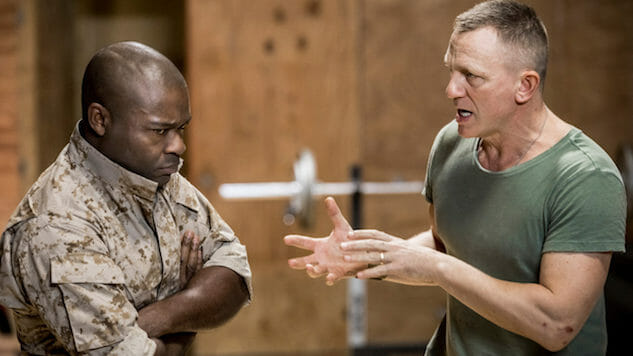Review: Othello
Chad Batka
Women cannot win in Othello, Shakespeare’s tragedy currently being revived in a compelling production at New York Theatre Workshop. The same could be said about many women in the Bard’s canon, but it is especially apparent in the tale of the ambitious moor led to his downfall through the manipulation of insecurity and jealousy by his supposed friend and confidante Iago.
Directed by Sam Gold, this production is decidedly stripped down and modern, set in army barracks designed by Andrew Lieberman, with the audience seated on either side in bleachers. Laptops and smart phones adorn the performance space, which is lit by Jane Cox with a collision of coldly institutional devices that include overhead fluorescence, hand-held flashlights and helmet-mounted LEDs, after the first scene, which is staged in complete darkness and during which Iago, who is played by Daniel Craig, discusses his hatred of the Othello, played by David Oyelowo.
Iago sets out to avenge himself against Othello’s overlooking him for a promotion by manipulating the insecurities of everyone around him, beginning with Roderigo (Matthew Maher), who is infatuated with Desdemona (Rachel Brosnahan), who just happens to have married Othello on the sly, much to the displeasure of her father Brabantio (Glenn Fitzgerald). Unable to believe his daughter would wed a man of color, Brabantio accuses Othello of using spells and potions to bewitch his daughter until she calmly informs him of the truth. As the Duke, David Wilson Barnes provides amusing commentary throughout the confrontation.
That’s an early scene in the play and an important one. When questioned by her father of which man she should remain loyal to, Desdemona replies that her husband deserves her loyalty the most. Despite her confidently measured speech, the scene is uncomfortable to watch as Brabantio calls Othello a “foul thief” and declares, “Fathers, from hence trust not your daughters’ minds” before telling his son-in-law to “use Desdemona well.” His apparent feelings of possession towards of his daughter are downright distressing, and Desdemona’s desire for independence and partnership is clear: When her husband is relocated, she expects to travel with him.
Brosnahan and Oyelowo share a sensual chemistry and one wishes Othello and Desdemona could live a happy life together, but it’s clear that is impossible, for this is a world in which independent women are quickly sent to their doom. As Iago plants seeds of doubt in Othello’s mind about Desdemona’s loyalty to him, he ignores his own wife, played with a solid assurance by Marsha Stephanie Blake, except for asking her to unknowingly aid him in his plans.
-

-

-

-

-

-

-

-

-

-

-

-

-

-

-

-

-

-

-

-

-

-

-

-

-

-

-

-

-

-

-

-

-

-

-

-

-

-

-

-








































